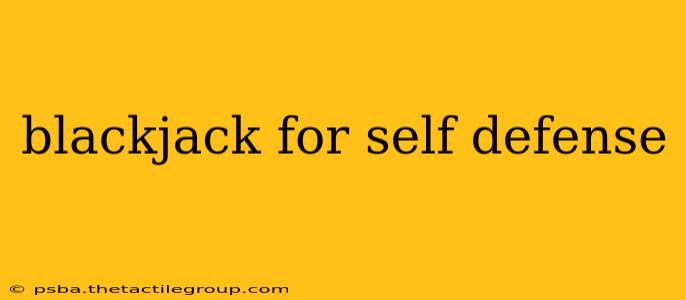Blackjacks, historically used as a self-defense weapon, have a controversial reputation. While their use in self-defense is a complex issue with legal ramifications varying by location, understanding their capabilities and limitations is crucial for anyone considering them. This guide delves into the intricacies of blackjacks for self-defense, addressing their effectiveness, legality, and ethical considerations.
Understanding the Blackjack Weapon
A blackjack is a flexible, weighted club typically consisting of a leather or canvas casing filled with lead shot, sand, or other dense material. Its flexible nature allows for a whip-like strike, maximizing the impact force while minimizing the risk of the weapon breaking upon contact. The weight distribution and flexibility are key factors determining its effectiveness.
Advantages of a Blackjack for Self-Defense
- Concealability: Blackjacks, particularly smaller models, can be easily concealed in a pocket or bag.
- Impact Force: The flexible nature of the weapon focuses the impact, delivering a potentially incapacitating blow.
- Relatively Low Risk of Fatal Injury (compared to other weapons): While capable of causing significant pain and injury, blackjacks are less likely to cause fatal wounds than edged weapons or firearms.
Disadvantages of a Blackjack for Self-Defense
- Limited Range: Blackjacks are effective only at close range.
- Requires Training and Skill: Effective use requires practice and understanding of proper striking techniques to maximize impact and minimize injury to the user. Improper use can be dangerous.
- Legal Ramifications: The legality of carrying and using a blackjack varies greatly by jurisdiction. Possession might be illegal in some areas, and using it in self-defense could lead to legal repercussions depending on the circumstances.
- Ethical Considerations: Using any weapon for self-defense involves ethical considerations. The potential for causing serious injury necessitates careful assessment of the situation.
Legality and Responsible Use
It is crucial to understand the laws in your specific location regarding the ownership and use of blackjacks. Laws differ significantly between states and countries. Some jurisdictions classify blackjacks as prohibited weapons, while others have less restrictive regulations. Ignoring these legal aspects can lead to severe penalties.
Even where legally permissible, using a blackjack in self-defense requires careful consideration. Excessive force can lead to legal trouble, even in a self-defense scenario. The principle of proportionality dictates that the force used must be proportionate to the threat faced.
Alternatives to Blackjacks for Self-Defense
Before considering a blackjack, explore safer and potentially more legally sound self-defense options:
- Self-defense classes: Learning effective self-defense techniques can significantly improve your ability to protect yourself without weapons.
- Pepper spray: A non-lethal option that can incapacitate an attacker temporarily.
- Personal alarm: A loud alarm can deter attackers and alert others nearby.
Conclusion
Blackjacks can provide a degree of self-defense, but their use comes with significant legal and ethical considerations. Their effectiveness relies heavily on training and proper technique. Understanding the local laws, the ethical implications, and the availability of alternative, less risky self-defense methods is paramount. Always prioritize personal safety and legal compliance when considering any self-defense tools. This information is for educational purposes only and does not constitute legal or self-defense advice. Consult with legal professionals and experienced self-defense instructors for personalized guidance.

